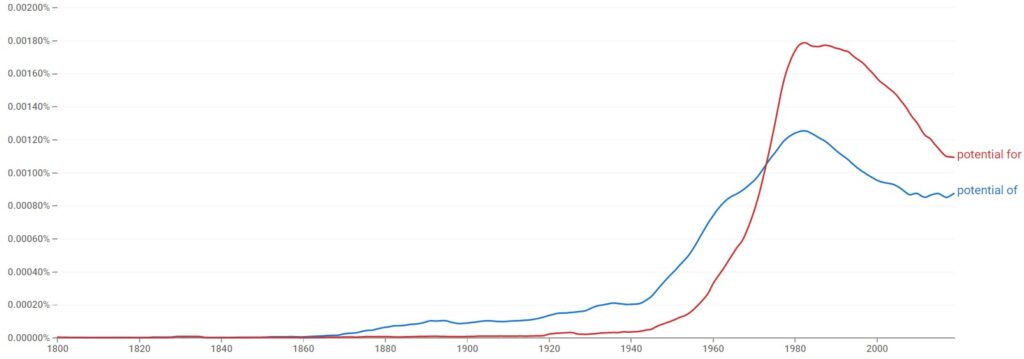The phrases “potential of” and “potential for” can be a subject of confusion for many readers and writers. Reading this article should make understanding this concept simple. This easy preposition guide will clarify in just a few steps which option to use: “potential of” or “potential for”.
Is It “Potential Of” Or “Potential For”?
Both the phrases “potential of” and “potential for” are acceptable to use in a sentence, but this is dependent on the sentence context. “Potential of” should be used when discussing the extent to which something can develop. “Potential for” should be used when referring to the possibility of something developing.

In adjective form, the word “potential” is used when saying that someone or something has the capabilities to develop, change or grow into the particular kind of person or thing in question.
If someone is described as having “potential”, they have the desired or necessary abilities or qualities to become successful or useful in the future.
If you say that someone has “potential” for doing something in particular, it may be possible they might achieve it. Similarly, if there is potential for something to happen, it may happen.
When Should I Use “Potential Of”?
The phrase “potential of” normally refers to the extent to which something can develop, be successful or occur at all. The phrase “potential of” can be used in a variety of sentences. The context of the sentence is important.
“Potential of” is a relatively formal phrase.
To help you understand when and how to use the phrase “potential of” in writing or conversation, take time to note the following example sentences:
- Sharon had the most potential of any staff they had encountered in the business so far.
- The neighbours were talking a lot about the potential of the town since the new housing development had been built.
- The potential of Clara in the modelling industry was clear to see when she wore her new black dress.
- Dan could possibly have the most potential of all the players in the football team.
- There was talk on the TV about the potential of a flood happening after the heavy storms.
- There is a distinct potential of the business growing in the next year if this continues.
- The potential of the new staff member was clear for everyone to see in the office.
When Should I Use “Potential For”?
The phrase “potential for” normally refers to the possibility of something working, developing, occurring at all, or being successful. The phrase “potential for” can also be used in a variety of sentences. The context of the sentence is important.
Like “potential of”, the phrase “potential for” is often used in more formal conversations and contexts.
To help you understand when and how to use the phrase “potential for” in writing or conversation, take time to note the following example sentences:
- There is potential for further profits if the popularity of the new chocolate bars continue to grow.
- Sharon has high potential for success in university following her high grades in school.
- There is potential for changes to happen in a positive way if everyone works together.
- After looking at the figures, Julie calculated that there was potential for more purchases this month.
- The business definitely has potential for the future after such a successful year.
- Jackie has the potential for great things if her self-confidence continues to grow.
- With his strong personality, Jack has the potential for being a TV presenter.
Is “Potential Of” Or “Potential For” Used The Most?
The phrase “potential for” is currently used more than “potential of”.
This graph from Google Ngram Viewer illustrates the usage of “potential of” and “potential for” in the time period 1800 to 2019. The line in red represents the usage of “potential for” and the line in blue represents “potential of”.

As you can see, previously the phrase “potential of” was used more, but now the phrase “potential for” is most used. Overall, the usage of the phrase is fairly similar.
Which Other Prepositions Can Be Used After “Potential”?
The word “for” is most often used following the word “potential”, creating the phrase “potential for”. “Potential of” is also a frequently used phrase. However, there are other prepositions which are used in combination with the word “potential”.
To help you to understand which other prepositions can be used with the word “potential”, here are some useful examples of possible prepositions to use in a sentence.
The most used prepositions with “potential”, after “potential for” and “potential of” are “potential in”, “potential to” and “potential with”.
Potential In
The phrase “potential in” means that someone has the necessary or required abilities or qualities to be useful or successful in a particular task, subject or action.
- Harry knew there was potential in his town.
- The teacher saw potential in Mary because her maths skills were evidently improving.
- As soon as Matt entered the interview room they recognised the potential in him.
Potential To
When “potential to” is used, this indicates that an event or action may happen.
- Being exposed to a lot of sun without protection has the potential to cause cancer.
- The new movie has the potential to be a great success.
- The slippery road surface has the potential to cause an accident.
Potential With
The phrase “potential with” means that something has a greater chance of improvement or growth when combined with something or someone else.
- The new theatre has definite potential with local council support.
- Flavour-wise, this soup has definite potential with using fresh tomatoes.
- The artist sees more potential with using new paintbrushes.
Final Thoughts
It is correct to use both the phrases “potential of” and “potential for” in a sentence, but the context of the sentence itself should determine whether and when to use each phrase in a sentence. Both phrases will make sense depending on the words used around the phrase. Currently, “potential for” is used more frequently than “potential of” but usage of the phrases is fairly similar in terms of statistics.

Martin holds a Master’s degree in Finance and International Business. He has six years of experience in professional communication with clients, executives, and colleagues. Furthermore, he has teaching experience from Aarhus University. Martin has been featured as an expert in communication and teaching on Forbes and Shopify. Read more about Martin here.
